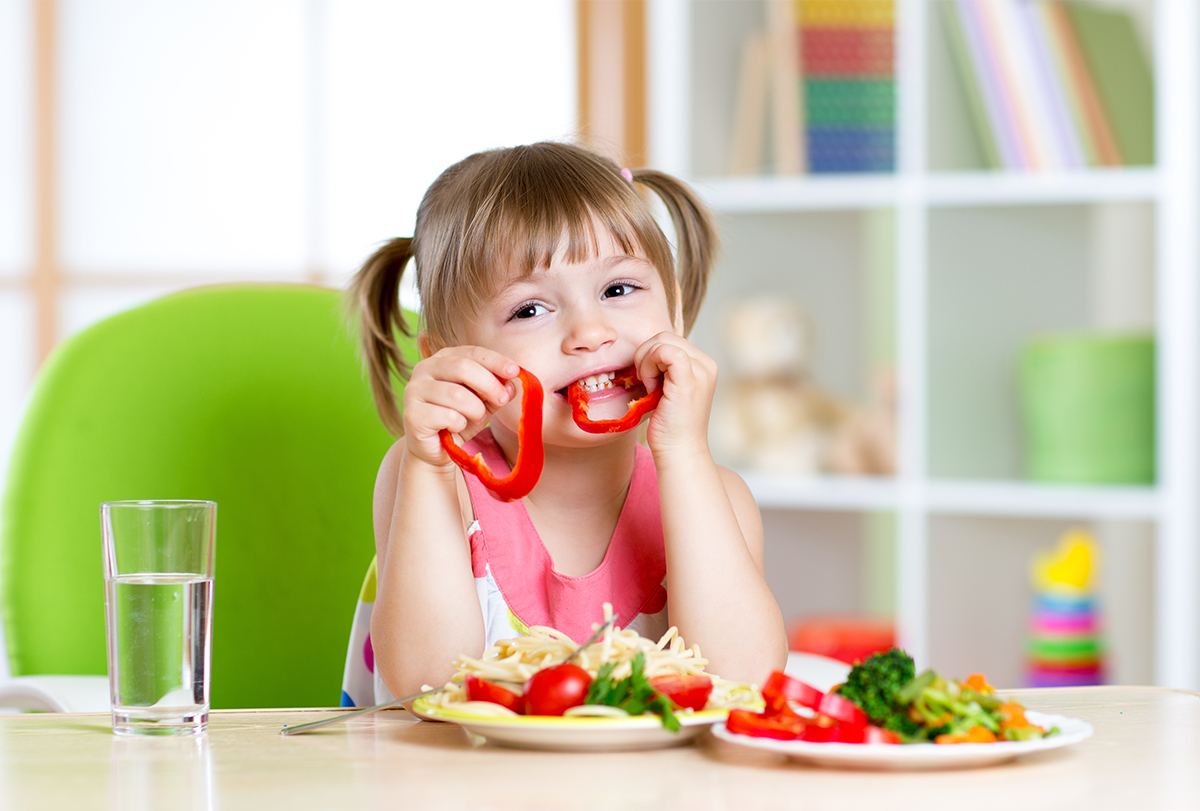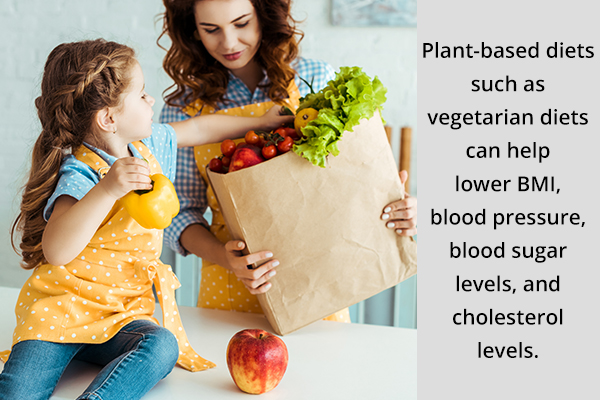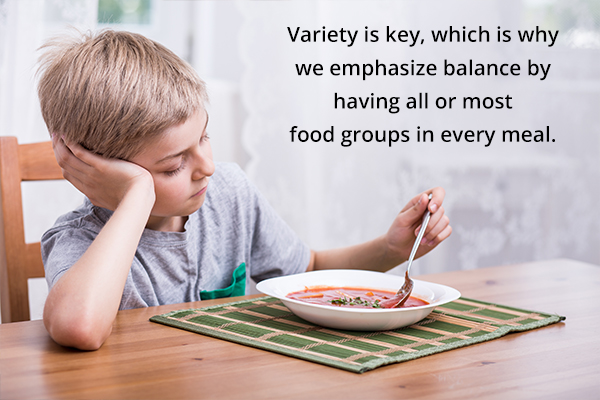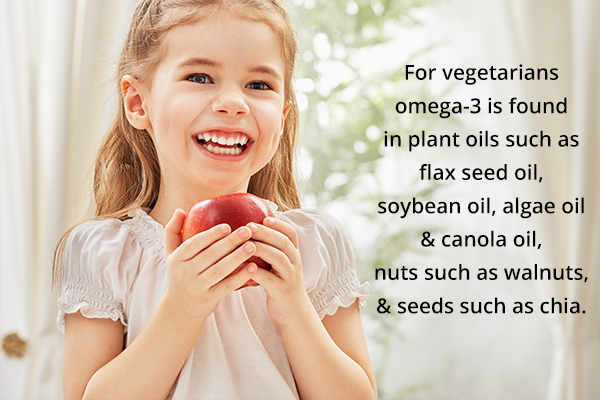In this article:
Children can lead healthy lives following a vegetarian diet and not feel deprived. I personally encourage parents and families as well as individuals to adopt a few vegetarian meals a week to benefit from plant-based thinking and meal planning.

It is safe, nutritionally fulfilling, and rather convenient with the wide variety of vegetarian options available nowadays. Trying some vegetarian meals can increase the variety of foods you eat, and there are many health benefits associated with plant-based meals.
Daily Calorie Requirement of Children
The nutritional and calorific needs of children change as they grow up. In general, toddlers up to 3 years old need 1000–1400 calories per day, and children up to 12 years old need 1200–2400 calories per day. (1)
There are ways to calculate calories based on age, sex, weight, height, and activity level, but you’d have to see a dietitian to calculate individual needs. With small children especially, calories should only be used as a general guideline. What’s more important is the quality and variety of foods consumed.
Health Benefits of a Vegetarian Diet for Children

Purely vegetarian eating can improve your child’s health and development in many ways. My favorite part about plant-based meals is that vegetables are at the center of the meal, making them the primary focus.
Vegetables are an incredible source of essential nutrients and fiber and are crucial to healthy eating in a Western diet. Unfortunately, people in the United States do not eat enough vegetables. The 2015–2020 dietary guidelines indicated that about 75% of Americans eat a diet low in vegetables, fruits, dairy, and oils. (1)
This is a shame because studies have shown that plant-based diets such as vegetarian diets can help lower BMI, blood pressure, blood sugar levels, and cholesterol levels, and these health issues are becoming more and more common in the United States and around the world. (2)
Physicians are now prescribing plant-based diets as a low-cost intervention to help manage diseases such as diabetes, hypertension, and heart disease. So, if children can be taught to enjoy more plant-based foods and meals by exposing them to healthier eating at a younger age, then maybe we can raise a generation that is seeing less of these health issues.
If that’s not reason enough, then think of how much money you will save. Vegetarian home-cooked meals are generally less expensive than meat-based meals.
Some Good Vegetarian Meal Ideas for Kids
Here are some of my favorite vegetarian meals that are also kid friendly:
1. Black bean quesadillas
Black bean quesadillas are delicious and filling. Beans are an excellent source of fiber, protein, and iron, and there are so many different beans to try.
2. Homemade veggie pizza
Homemade veggie pizza is fun to make. Let the kids pick their favorite vegetable toppings. Don’t be afraid to get a little weird with different combinations. The more colorful, the better.
3. Pasta primavera
Pasta primavera combines your child’s love of pasta with freshly cooked vegetables. It’s a quick, low-cost, and easy meal to make.
4. Veggie omelets
Veggie omelets are a great way to get vegetables in the morning. Eggs are a delicious source of healthy fat and protein and provide many different types of vitamins and minerals, such as folate, vitamin A, B vitamins, vitamin D, iron, and calcium, just to name a few.
5. Veggie stir-fries
Veggie stir-fries are another easy and quick versatile dish the family will love. You can use rice, noodles, quinoa, etc. The seasonings make this dish, so make sure to add garlic, onions/scallions, peppers, ginger, low-sodium soy sauce, and sesame oil or sesame seeds.
Add any other vegetables of your choice – broccoli, carrots, baby corn, peas, kale, the possibilities are endless.
6. Vegetable lasagna
Vegetable lasagna is a comforting pasta dish that can be made in batches because it does not lose its flavor or texture when reheated. You can’t go wrong with this warm cheesy goodness. You make it healthier, more filling, and more nutritious by adding your favorite vegetables.
7. Vegetable soups
Vegetable soups are a great way to boost your immune system, stay hydrated, and provide warm comfort for the whole family, especially now that the fall and winter seasons are coming.
They can also be very versatile and are great for batch cooking. Vegetable soup is one of my favorite foods to make when I’m feeling sick.
Common Nutrient Deficiencies Among Vegetarian Children

Nutrients are especially important to monitor with selective or choosy eaters regardless of the diet. If your child is refusing to eat an entire food group, then you may need to seek assistance from a dietitian or medical professional before giving supplements.
Making sure all the necessary nutrients are being met at the appropriate levels requires planning. Variety is key, which is why balance is emphasized by having all or most food groups in every meal.
Vegetarian meals are no different. If you include a variety of vegetables, fruits, whole grains, protein, and some dairy/dairy alternatives in most meals, your child will likely not miss out on any nutrients.
If your child is a “picky” vegetarian or a vegan, as in they do not consume eggs or dairy, a B12 supplement may be recommended. B12 is the main nutrient concern with vegan diets because it is more easily found in meats, dairy, and eggs, which vegans do not consume.
Vegans have to make an effort to use nutritional yeast, which is a good source of B12, and consume foods that are fortified with B12, such as soy milk, almond milk, cereals, and plant-based meats. Even still, they might need a B12 supplement.
Best Vegetarian Sources of Essential Nutrients
All nutrients are needed for proper growth and development. The American Academy of Pediatrics emphasized protein, zinc, iron, choline, folate, iodine, long-chain polyunsaturated fatty acids, and vitamins A, D, B6, and B12 for brain development. (3)
Calcium is an important nutrient for bone development. Many children don’t get enough iron and calcium according to the American Academy of Pediatrics. (4)(5)
Vegetarian sources of iron include beans, dark green vegetables such as spinach and broccoli, eggs, dried fruit especially prunes, and fortified breads and cereals. Iron is best absorbed when combined with vitamin C found in citrus fruits, peppers, and Brussels sprouts.
Vegetarian sources of calcium include cheese, yogurt, cow’s milk, and fortified milk alternatives such as soy milk and almond milk. It’s easier and more effective to focus on the food groups rather than the individual nutrients.
Unless your health care provider indicates your child has low levels of a specific nutrient, just focus on giving your child variety in every food group and in every meal.
What Is the Best Form of Vitamin D and Omega-3 Fatty Acids for Vegetarian Children?

Vitamin D is unique in that it is not naturally found in a lot of foods, vegetarian or otherwise. One of the best sources of vitamin D for pescatarians is fatty fish, such as salmon, tuna, or mackerel. Vegetarians can have egg yolks and mushrooms, both of which have a small amount of vitamin D.
The most common sources of dietary vitamin D are added or fortified to foods such as milk, orange juice, cereals, and some yogurts. For most children, and adults, the best way to get vitamin D is from the sun. About 30 minutes of sun exposure a day on most of their body (face, arms, legs, and hands) is recommended. (6)(7)
In certain areas of the world or during certain times of the year, such as winter, where there is limited sun exposure, a supplement may be recommended.
Omega-3 is a little easier to obtain from vegetarian meals. It is found in nuts such as walnuts, seeds such as chia, and plant oils such as flaxseed oil, soybean oil, algae oil, and canola oil. (8) Seaweed and algae are also great sources of omega-3 and are used a lot in Asian cuisines.
A lesser known high omega-3 source is purslane, which is a commonly found weed that tastes like spinach, watercress, or arugula, depending on your palate. Purslane can be added to salads or mixed in sauces and soups.
For pescatarians, fatty fish are also an excellent source of omega-3s.
Planning a Wholesome Vegetarian Meal for Children
As I mentioned, it’s important to include almost every food group, if not all food groups, in every meal, be it breakfast, lunch, or dinner.
Emphasis needs to be given to fruits and vegetables because they are low in calories and packed with nutrients needed for children to grow, and many children do not eat enough of them.
Also, having a variety of protein options, such as beans, lentils, nuts, eggs, dairy/dairy alternatives, and whole grains, will ensure your child is eating healthy and balanced.
Expert Tips for Parents Who Want to Raise Their Children as Vegetarians

1. There are many types of plant-based meals to choose from
You can pick dairy and eggs (lacto-ovo vegetarian), eggs only (ovo vegetarian), dairy only (lacto vegetarian), pescatarian (fish/seafood + vegetarian), or vegan.
The most important thing is that your child enjoys the meals and foods offered. If you find that one way of eating does not work for your child, try another.
2. Variety is key
Kids get bored with the same meals and foods just as adults do. Try new recipes, spices, and ways of cooking food. You can eat certain foods raw and you can bake, sauté, boil, steam, and occasionally fry – try them all, especially with picky eaters.
Mix and match different ingredients. Giving a variety of foods will better ensure your child is getting all the nutrients they need.
3. Do as you say
Children pay more attention to what you do rather than what you say. If they see you eating a well-balanced, healthy vegetarian diet, they are more likely to follow your example than your words.
4. Teach mindful eating habits
Talk to your child about why food is so important for the body and where food comes from. Show them how to cook and prepare some snacks and meals when they reach an appropriate age, and let them serve themselves and feed themselves.
Talk about hunger cues – what it feels like to be hungry, to be full, to be almost full, to be stuffed – and how that might affect how you feel later. What happens when you don’t eat enough or when you eat too much?
Let your child pick what to cook or eat one day a week. This is great practice for when they become independent. All these are important for them to develop healthy relationships with food and become self-sufficient.
Final Word
Vegetarianism has emerged as a healthy way of eating, not just for adults but for children too. But many people doubt if they can derive all their nutritional needs from plant-based sources alone. This concern is more pronounced in the case of children who need a wholesome diet in order to grow properly.
As discussed above, these reservations may be relevant but are not well founded. There is a growing consensus among dietary and medical experts regarding the safety and wholesomeness of a vegetarian diet.
Vegetables are loaded with nutrients and fiber that are essential for your physical and cognitive development as well as various life-sustaining metabolic functions. Vegetables are considered a crucial source of nourishment in Western diet plans, but most people tend to prefer meat products over them.
The good habits you inculcate in your children at a young age often stay with them throughout their lives. The same applies to eating habits as well. But make sure to gradually accustom your child to vegetarianism rather than imposing it on them.
Children can lead healthy lives following a vegetarian diet and not feel deprived. The most important thing is that children enjoy their meals.
- Was this article helpful?
- YES, THANKS!NOT REALLY


